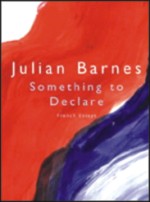|
Book
Review
New
Gauls, Please
Julian
Barnes's love affair with France is based on a wilful fantasy.
Jason Cowley detects a taint of vanity publishing in this
collection of recycled journalism, Something to Declare

Something to Declare
Julian Barnes
Picador, £8.99 pp302 |
Julian
Barnes's most celebrated novels - Flaubert's Parrot and The
History of the World in 10½ Chapters - are not really
novels, they are stylised essays in which Barnes excels at
smoothing the world into knowing aphorism and smart generalisation.
A little
bit of art criticism, some literary biography, a couple of
pages of history, the odd self-revealing nugget or two - it's
all there in Barnes. But he isn't at his best as a writer
of fiction, at making things up: his intelligence is too controlling,
his tone too often superior, he has little gift for character
or narrative, no real vision of contemporary crisis. There's
something anodyne about even his best work; it has the cerebral
coldness of a crossword or mathematical puzzle.
You don't
read Barnes to be transported into imaginary realms, or to
encounter the struggle and pathos of humanity. You read him,
rather, for that superior tone and for his voice; in many
ways, his novels are all voice - amused, languorous, insouciant
and arch. You read him for his hauteur, his gift of cultivated
digression and for his riffs and anecdotes. Above all, you
read him as an essayist, one of our best.
Nowadays,
any newspaper columnist who can sustain an argument of more
than 1,000 words is recognised as an essayist, but the popularity
of the column or 'piece' is no more than an example of the
cheap popularisation of the essay in a degraded culture. Dr
Johnson called the essay an 'irregular, undigested piece'.
That is right. The column is too regular, too finished; it's
an easily digested piece. But the essay, as perfected by Montaigne,
Charles Lamb and EB White, strives for literary permanence.
It concerns the search for a personal voice, of the kind that
animates the most successful offerings in Barnes's new book
of essays about France.
Barnes
first visited France in the summer of 1959. He was 13, on
holiday with his parents, and was enchanted; he has been returning,
at irregular intervals, ever since. France, it seems, is the
idealised Other against which he measures all other countries,
including England, and finds them, by contrast, a perplexing
disappointment. He accepts many of the stereotypes about the
French: that they are Cassanovan in sex and Machiavellian
in politics; that they are 'relaxed about pleasure' and treat
the arts 'as central to life, rather than some add-on, like
a set of alloy wheels'.
He approvingly
recalls the story of how, after British Airways had refused
to fly Salman Rushdie because of the fatwa, Air France announced
that it respected the French custom regarding the rights of
man, 'which means that we transport passengers without discrimination.
If Mr Rushdie wished to travel with Air France, he would not
be refused'. To Barnes, that act of generosity signified the
difference between French idealism and British pragmatism.
'In public life,' he concludes, 'the French are just as hypocritical
as we are; the difference would seem to be that their hypocrisy
pays lip-service to idealism, whereas ours pays lip-service
to pragmatism.'
Yet there's
little, for instance, that has been idealistic about French
foreign policy in recent years. The cynical cultivation of
Robert Mugabe; the disastrous, wrong-headed interventions
in Rwanda, which contributed in no small part to the genocide
of 1994; the stubborn insistence on carrying out nuclear tests
in what is left of the old Francophone Pacific island colonies;
the refusal to import British beef: France, more than any
other European liberal democracy, seems to have acquired the
knack of international self-disgrace.
But the
France of this disgrace and, more generally, of the Vichy
collaboration, of constant capitulation to the Germans, of
the war of independence in Algeria, of the ridiculous Académie
Française and of persistent, low-level paranoid suspicion
of les anglo-saxons isn't the France of Barnes's imagination.
It's not the gentle, refined land he encountered in adolescence
and has been wooing every since.
Barnes
has reached that happy stage in his life when almost anything
he writes - reviews, prefaces, magazine profiles, shopping
lists - is deemed worthy of collection between hard covers.
'Any new book from Julian Barnes,' his publishers tell us,
'is a major event.' But this unsatisfactory offering is about
as much of an event as a Worthington Cup semi-final, not because
the writing quality isn't high - Barnes is incapable of writing
a clumsy sentence - but because recycled journalism too often
carries a taint of vanity publishing - this book is no exception.
The most
readable essay here, first published in the New Yorker, is
about the Tour de France, what the American Lance Armstrong,
double-winner of the Tour, has called 'a contest in purposeless
suffering'. The Tour is the icon of the French nation, the
greatest and most venerated of all sporting endurance events.
Barnes
is very good on the boisterous democracy of the Tour, which
is free to watch, and contrasts this with the vulgar spectacle
of commerce that is the modern mass sporting event, with its
'professional exploitation of the fan's emotions'. Add to
this some first-class reportage, an amusing reflection on
Petrarch, who climbed Mont Ventoux in 1336, and what you have
is a model essay, a mini-masterpiece of wit, precision and
elegant poise. Would that he left his desk more often
Copyright
(R) thedailystar.net 2005
|
